Gregory M. Lanza, MD, PhD
Professor
Washington University School of Medicine
Briefly, Dr. Gregory Lanza MD PhD is a Professor of Medicine and a board-certified cardiologist, with adjunctive appointments in Biomedical Engineering and Biological Sciences. He is honored to be the Oliver M. Langenberg Distinguished Professor of the Science and Practice of Medicine. He directs the Consortium for Translation Research in Advanced Imaging and Nanomedicine (C-TRAIN) and is a member of the prestigious Siteman Cancer Center at Washington University in St. Louis. As an established NIH principle investigator, Greg has published over 250 peer-reviewed published manuscripts, been awarded over 30 US issued patents, and given over 150 invited presentations worldwide since the turn of the century. Dr. Lanza has been standing member of NIH study groups as well as standing or ad hoc scientific advisor to corporations, government, and academic programs. He has been privileged to be an associate editor or board member of several respected journals in the general field of nanomedicine, imaging and drug delivery.
Dr. Lanza received a BA from Colby College in Waterville, Maine and a MS and PhD from the University of Georgia in quantitative physiological genetics in poultry in 1981. He joined Monsanto Company as a Senior Research Biologist in 1981 to participate in the development of the new emergent capability of recombinant DNA as the Research Manager responsible for the preclinical biology of this first of its kind 14-day parenteral, controlled release product of a 20,000 Kd protein (i.e., BST), which is marketed today as Posilac® by Elanco.
Upon completing the US and Ex-US regulatory submissions for Posilac, Dr. Lanza matriculated at Northwestern University Medical School in Chicago, where he received an MD degree in 1992, There he patented the first targeted ultrasound contrast agent as a student in the Division of Cardiology at Northwestern University Medical School. Dr. Lanza completed residency in Internal Medicine and Cardiology fellowship (1994-1999) at Barnes-Jewish Hospital at Washington University School of Medicine.
Dr. Lanza co-invented a perfluorocarbon-based, targeted theranostic contrast agent for thrombus and later angiogenesis, which was sublicensed to Kereos, Inc. As a scientific co-founder and CSO of Kereos, Inc., the company brought two αvβ3-targeted MR diagnostic agents to the clinic under US and ex-US INDs for cancer and atherosclerosis applications. Over the past decade, Dr. Lanza and lab have designed, patented, and out-licensed numerous nanotechnologies directed toward Spectral CT, MRI, Photoacoustic, and Optical imaging as well as drug delivery, particularly with lipase labile prodrugs, which were licensed for clinical development. New technologies are in research and development for patients with Multiple Myeloma as part of WUMS Multiple Myeloma Nanotechnology program – an NCI CCNE site and for breast cancer metastases to the bone. The Lanza lab has developed a fibrin-specific 99mTc-probe capable of binding and detecting fibrin deposits in LVADs, which will augment clinical management of anticoagulation to avoid embolic stroke and minimize serious bleeding events. His lab invented a novel biconcave functional artificial erythrocyte mimic that is now out-licensed to KaloCyte for development.
Presentation(s):
-
Thursday, January 30, 2025
8:35 AM - 8:45 AM East Coast USA Time -
AI-CINE Increases Speed, Decreases Breath holds, and Enhances Quantification (RF_TH_252)
Thursday, January 30, 2025
3:30 PM - 3:40 PM East Coast USA Time

